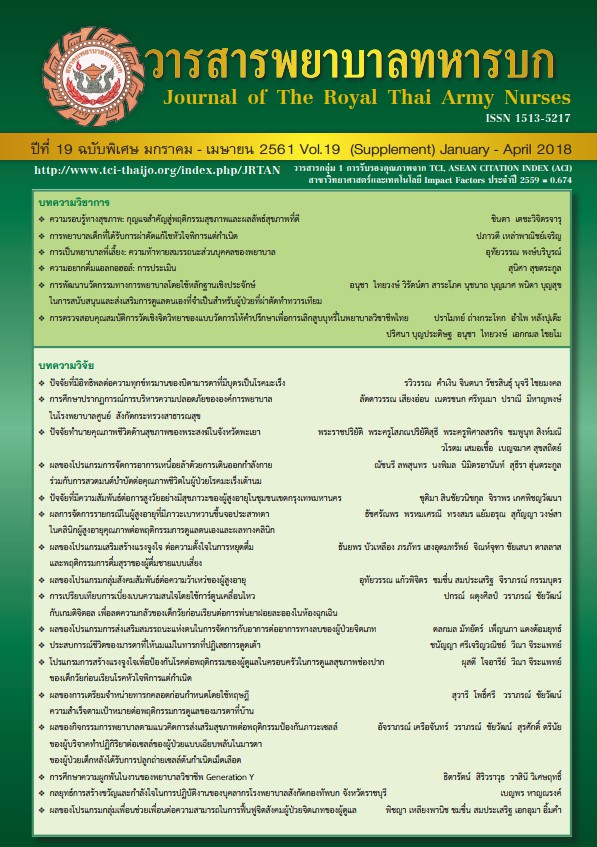The Effects of Buddhist Meditation Therapy Program on Life Happiness of the Elderly with Hypertension at a Community in Phetchaburi Province
Keywords:
Elderly, Hypertension, Buddhist meditation therapy, Life happinessAbstract
This research was a quasi-experimental study two group pretest-posttest design. The purpose was to examine the effects of Buddhist meditation therapy program on life happiness of the elderly with hypertension.The subjects were 52 older persons with hypertension. They had been sampling by multi – stage, random sampling technique and divided into an experimented and a comparison group on 26 cases each. The experimental group received the 8-week Buddhist meditation therapy program which applied Watson’s Caring Theory and chronic care model with Buddhist integration. This program consisted of 1) trust establishment 2) interpersonal relationship promotion 3) home-based environment support and 4) knowledge sharing. Data collection used demographic data, self-care behavior, and life happiness scores. The reliability was at 0.75 and 0.84 respectively. Data were analyzed using descriptive statistics and t - test. The results revealed that after the intervention, the experimental group had significantly higher mean scores of self-care behavior and life happiness than before the intervention, and than those in the comparison group, while the experimental group had significantly lower mean scores of blood pressure than before the intervention and than the comparison group. The researcher recomment that the Buddhist meditation therapy program is effectively enhance happiness for the elderly with hypertension. Therefore, nurse practitioners and healthcare providers should contribute this program in primary care service for caring the elderly with hypertension to promote life happiness and well-being.
Downloads
References
2. Boribun N, Lerttrakarnnon P, Siviroj P. Prevalence and associated factors of the frailty among community-dwelling elders in Sermngam district, Lampang province. Journal of Medicine and Health Sciences 2017;1:45-54. (in Thai)
3. Wongpanarak N, Chaleoykitti S. Depression: A significant mental health problem of elderly. Journal of The Royal Thai Army Nurses 2014; 15(3):24-31. (in Thai)
4. The Thai Hypertension Society. Thai guidelines on the treatment of hypertension update 2015. Chiangmai: Trickthink Printing; 2015. (in Thai).
5. World Health Organization. Global health estimates: Deaths by cause, age, sex and country 2000-2012. Geneva: WHO; 2014.
6. Vichai E. Thai national health examination survey. Health Systems Research Institute (HSRI) 2016;149-155.
7. Department of Mental Health, Ministry of Public Health. Blueprint for change and action plan for change. Nonthaburi: Thai mental health department of mental health; 2014. (in Thai).
8. Chatchanai M, Pongvoraphong P, Suchat C. Hypertensive care with alternative medicine. Nontabubi: Department for Development of Thai Traditional and Alternative Medicine Ministry of Public health; 2016. (in Thai).
9. Kittikhun S. Buddhist principles of holistic health care in elderly people. Journal of Mahachulalongkorn 2017;1:11-25. (in Thai).
10. Siriwan P, Khunta B, Khanittha N. Experiences of the rural elderly with chronic illnesses in applying the Buddha’s teachings to their Life. Songklanagarind Journal of nursing 2014;2: 39-52. (in Thai).
11. Somporn Kantharadussadee T. Meditation for holistic self - healing and cells healing. Mahasarakham: Mahasarakham University; 2015. (in Thai).
12. Supaporn N. Effect of practicing SKT 2 healing meditation to blood pressure level of essential hypertensive patients. Journal of Nursing and Health Sciences 2015; 9:14-22. (in Thai).
13. Wichai N, Somkit T, Maonthana O, Jinda K. Effects of the SKT2 meditation practice on blood pressure in hypertension patients of Thai traditional and complementary medicine Pattani hospital. AL-NUR 2016;1:48-60. (in Thai).
14. Anderson JW, Liu C, Kryscio RJ. Blood pressure response to transcendental meditation: a meta-analysis. American Journal of Hypertension 2008;3:310-316.
15. Phetchaburi Provincial Health Office. Guidelines for the treatment and care of chronic high blood pressure. Phetchaburi: Phetchaburi Provincial Health Office; 2016. (in Thai).
16. Watson J. Nursing: the philosophy and science of caring (Revised. Edition). Boulder, Colo. University Press of Colorado; 2008.
17. Somchai P, Uthai S. A model of caring for chronic illness patients by Buddhist integration. Santisueksaparitat 2015;2:45-62. (in Thai).
18. Saija P. Adaptive thinking: a prism and its application to health promotion. Chon Buri: Kheratei Printing; 2016. (in Thai).
19. Panan P. Nursing theory and application: Individual, family, and community. Bangkok: Denex Inter Corporation; 2013. (in Thai).
20. Johnphajong P. Apply Watson, s Human Theory into palliative care. The Thai Red Cross College of Nursing 2010;1-3:1-16. (in Thai).
21. Department of Health Ministry of Public Health. Guide to Screening / evaluating the elderly department of medical services; 2015. (in Thai).
22. Kotchakorn T, Kwanjai A, Patcharaporn K, Jintana A . Effects of self-care promoting program on self-care agency and self- care behavior among
older adults with uncontrolled hypertension in Bangkok Metropolitan. Journal Public Health Nursing 2015;2:43-55. (in Thai).
23. Sujitra S, Nongnuch R. Happiness of the elderlies in nursing homes in Nakhon Pathom province. Journal of the Police Nurse 2014;1:204-208.
(in Thai).
24. Bernick L. Caring for older adults: practice guide by Watson’s Caring Healing Model. Nursing Science Quarterly 2009;2:128-134.
25. Prawpan S, Prakaidaw S, Satawat W, Ununma A, Napassawan S.Effect of Sahaja yoga practice On blood pressure heart rate and stress among
hypertension patients. Journal of Nursing and Health Science 2010;4:28-35.
26. Supap I, Thapanawong M. Effectiveness of a praying therapy for blood pressure control of hypertensive patients. Journal of Nursing and Health Care 2015;2:44-53.(in Thai).
27. Dusek J A, Benson H. Mind-body medicine. Minn Med 2009;5:47-50.
28. Somying K. The outcomes of mental health promotion program for the elderly with chronic Illness.[Master’s Degree Thesis]. Nakhon pathom: Christian University of Thailand; 2556. (in Thai).
Downloads
Published
How to Cite
Issue
Section
License
บทความหรือข้อคิดเห็นใดใดที่ปรากฏในวารสารพยาบาลทหารบกเป็นวรรณกรรมของผู้เขียน ซึ่งบรรณาธิการหรือสมาคมพยาบาลทหารบก ไม่จำเป็นต้องเห็นด้วย
บทความที่ได้รับการตีพิมพ์เป็นลิขสิทธิ์ของวารสารพยาบาลทหารบก
The ideas and opinions expressed in the Journal of The Royal Thai Army Nurses are those of the authors and not necessarily those
of the editor or Royal Thai Army Nurses Association.






